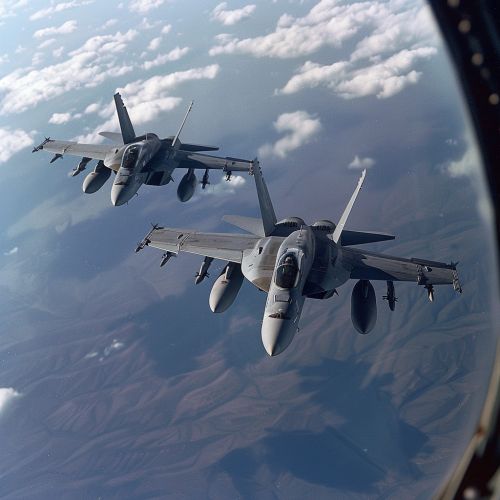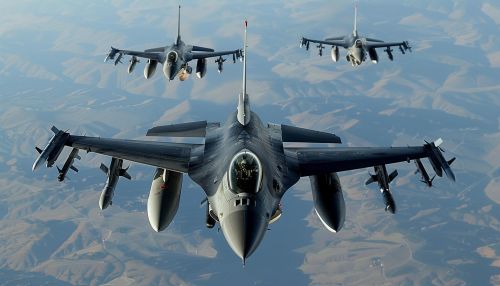Wingmen
Wingmen
A wingman is a pilot who supports another in a potentially dangerous flying environment, often in military aviation. The term has evolved to describe a supportive companion in various contexts, including social settings and professional environments. This article delves into the origins, roles, and applications of wingmen, providing a comprehensive understanding of the concept.
Origins and Historical Context
The term "wingman" originated in military aviation during World War I. The concept was developed to enhance the effectiveness and survivability of fighter pilots. A wingman would fly alongside and slightly behind the lead pilot, providing support and covering the lead's blind spots. This formation, known as the "finger-four" or "vic" formation, became a fundamental tactic in aerial combat.
The role of the wingman was further refined during World War II and the Korean War, where the importance of mutual support and situational awareness became evident. The United States Air Force and other military organizations formalized wingman tactics, integrating them into pilot training programs.


Tactical Roles and Responsibilities
In a military context, a wingman has several critical responsibilities:
- **Mutual Support:** The wingman provides backup to the lead pilot, ensuring that they are not overwhelmed by enemy forces. This includes engaging enemy aircraft, providing cover during maneuvers, and sharing situational awareness.
- **Communication:** Effective communication between the lead and wingman is crucial. This involves constant updates on position, threats, and tactical decisions.
- **Formation Flying:** Maintaining proper formation is essential for maximizing the effectiveness of the flight. The wingman must stay in position relative to the lead, adjusting for changes in speed, altitude, and direction.
- **Defensive Maneuvers:** The wingman assists in defensive tactics, such as the "Thach Weave," where two aircraft weave in and out of each other's paths to confuse and evade enemy fighters.
Evolution into Social and Professional Contexts
The concept of a wingman has transcended its military origins and found applications in social and professional settings. In these contexts, a wingman is someone who provides support, companionship, and assistance to another individual.
Social Wingman
In social scenarios, a wingman helps their friend navigate social interactions, particularly in dating environments. The social wingman offers encouragement, introduces their friend to potential partners, and helps create a comfortable atmosphere. The role requires empathy, social skills, and the ability to read situations accurately.
Professional Wingman
In the professional realm, a wingman can be a colleague or mentor who supports another in achieving career goals. This includes providing guidance, sharing knowledge, and offering constructive feedback. The professional wingman helps their counterpart navigate workplace dynamics, build networks, and develop skills.
Psychological and Sociological Perspectives
The wingman concept is deeply rooted in psychological and sociological principles. The presence of a supportive companion can significantly impact an individual's confidence, decision-making, and overall well-being.
Psychological Benefits
- **Increased Confidence:** Having a wingman can boost an individual's confidence, reducing anxiety and fear in challenging situations.
- **Enhanced Decision-Making:** A wingman provides a second perspective, helping to evaluate options and make informed decisions.
- **Emotional Support:** The emotional backing of a wingman can alleviate stress and promote a sense of security.
Sociological Implications
- **Group Dynamics:** The wingman dynamic influences group behavior, fostering cooperation and mutual support.
- **Social Norms:** The role of a wingman is shaped by cultural and social norms, which dictate acceptable behaviors and interactions.
- **Interpersonal Relationships:** The wingman relationship can strengthen bonds between individuals, promoting trust and camaraderie.
Training and Development
In military aviation, wingman skills are developed through rigorous training programs. These programs emphasize teamwork, communication, and tactical proficiency. Pilots undergo extensive simulation exercises, live-flight training, and debriefing sessions to hone their abilities.
In social and professional contexts, wingman skills can be cultivated through experience, mentorship, and personal development. Key areas of focus include:
- **Communication Skills:** Effective verbal and non-verbal communication is essential for a successful wingman.
- **Empathy and Emotional Intelligence:** Understanding and responding to the needs and emotions of others is crucial.
- **Situational Awareness:** Being aware of the environment and dynamics at play helps a wingman provide timely and appropriate support.
Cultural Representations
The wingman concept has been popularized in various forms of media, including films, television shows, and literature. Notable examples include:
- **Top Gun (1986):** The film features iconic portrayals of wingmen in a military aviation setting, highlighting the importance of trust and teamwork.
- **How I Met Your Mother:** The character Barney Stinson frequently assumes the role of a social wingman, offering humorous and exaggerated advice on dating.
- **Band of Brothers:** The miniseries depicts the camaraderie and mutual support among soldiers, illustrating the wingman dynamic in a historical context.
Ethical Considerations
The role of a wingman, while generally positive, can raise ethical questions. In social settings, the wingman's actions must respect the autonomy and consent of all parties involved. In professional environments, the wingman must balance support with honesty, avoiding enabling harmful behaviors or unethical practices.
Conclusion
The wingman concept, originating in military aviation, has evolved to encompass a wide range of supportive roles in social and professional contexts. The effectiveness of a wingman lies in their ability to provide mutual support, enhance communication, and foster trust. Understanding the psychological, sociological, and ethical dimensions of the wingman role can help individuals navigate complex interactions and build stronger relationships.
